2025
-
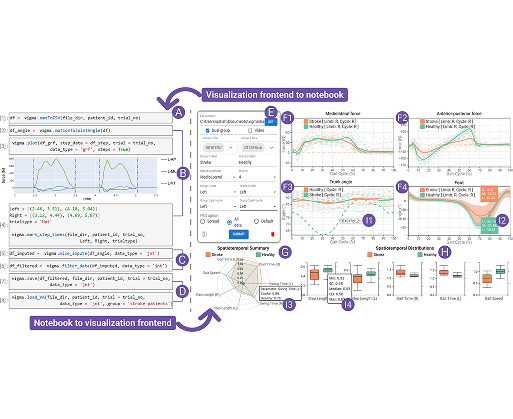 VIGMA: An Open-Access Framework for Visual Gait and Motion AnalyticsKazi Shahrukh Omar, Shuaijie Wang, Ridhuparan Kungumaraju, and 2 more authorsIEEE Transactions on Visualization and Computer Graphics, 2025
VIGMA: An Open-Access Framework for Visual Gait and Motion AnalyticsKazi Shahrukh Omar, Shuaijie Wang, Ridhuparan Kungumaraju, and 2 more authorsIEEE Transactions on Visualization and Computer Graphics, 2025Gait disorders are commonly observed in older adults, who frequently experience various issues related to walking. Additionally, researchers and clinicians extensively investigate mobility related to gait in typically and atypically developing children, athletes, and individuals with orthopedic and neurological disorders. Effective gait analysis enables the understanding of the causal mechanisms of mobility and balance control of patients, the development of tailored treatment plans to improve mobility, the reduction of fall risk, and the tracking of rehabilitation progress. However, analyzing gait data is a complex task due to the multivariate nature of the data, the large volume of information to be interpreted, and the technical skills required. Existing tools for gait analysis are often limited to specific patient groups (e.g., cerebral palsy), only handle a specific subset of tasks in the entire workflow, and are not openly accessible. To address these shortcomings, we conducted a requirements assessment with gait practitioners (e.g., researchers, clinicians) via surveys and identified key components of the workflow, including (1) data processing and (2) data analysis and visualization. Based on the findings, we designed VIGMA, an open-access visual analytics framework integrated with computational notebooks and a Python library, to meet the identified requirements. Notably, the framework supports analytical capabilities for assessing disease progression and for comparing multiple patient groups. We validated the framework through usage scenarios with experts specializing in gait and mobility rehabilitation. VIGMA is available at https://github.com/komar41/vigma.
@article{omar2025vigma, title = {VIGMA: An Open-Access Framework for Visual Gait and Motion Analytics}, doi = {https://doi.org/10.1109/TVCG.2025.3564866}, author = {Omar, Kazi Shahrukh and Wang, Shuaijie and Kungumaraju, Ridhuparan and Bhatt, Tanvi and Miranda, Fabio}, journal = {IEEE Transactions on Visualization and Computer Graphics}, volume = {31}, number = {10}, pages = {8143--8158}, year = {2025}, publisher = {IEEE} } -
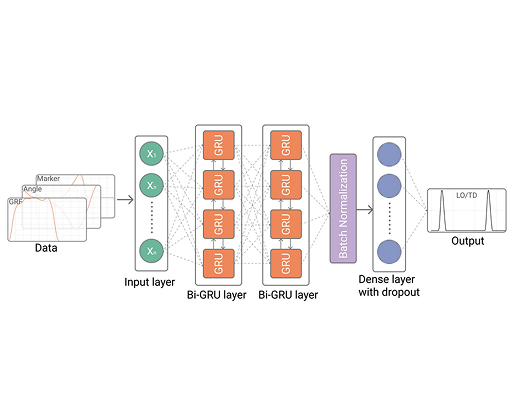 Automatic Gait EVENT Detection in Older Adults During Perturbed WalkingShuaijie Wang, Kazi Shahrukh Omar, Fabio Miranda, and 1 more authorJournal of NeuroEngineering and Rehabilitation, 2025
Automatic Gait EVENT Detection in Older Adults During Perturbed WalkingShuaijie Wang, Kazi Shahrukh Omar, Fabio Miranda, and 1 more authorJournal of NeuroEngineering and Rehabilitation, 2025Accurate detection of gait events in older adults, particularly during perturbed walking, is essential for evaluating balance control and fall risk. Traditional force plate-based methods often face limitations in perturbed walking scenarios due to the difficulty in landing cleanly on the force plates. Subsequently, previous studies have not addressed gait event automatic detection methods for perturbed walking. This study introduces an automated gait event detection method using a bidirectional gated recurrent unit (Bi-GRU) model, leveraging ground reaction force, joint angles, and marker data, for both regular and perturbed walking scenarios from 307 healthy older adults. Our marker-based model achieved over 97% accuracy with a mean error of less than 14 ms in detecting touchdown (TD) and liftoff (LO) events for both walking scenarios. The results highlight the efficacy of kinematic approaches, demonstrating their potential in gait event detection for clinical settings. When integrated with wearable sensors or computer vision techniques, these methods enable real-time, precise monitoring of gait patterns, which is helpful for applying personalized programs for fall prevention. This work takes a significant step forward in automated gait analysis for perturbed walking, offering a reliable method for evaluating gait patterns, balance control, and fall risk in clinical settings.
@article{wang2025automatic, title = {Automatic Gait EVENT Detection in Older Adults During Perturbed Walking}, doi = {https://doi.org/10.1186/s12984-025-01560-9}, author = {Wang, Shuaijie and Omar, Kazi Shahrukh and Miranda, Fabio and Bhatt, Tanvi}, journal = {Journal of NeuroEngineering and Rehabilitation}, volume = {22}, number = {1}, pages = {40}, year = {2025}, publisher = {Springer} } -
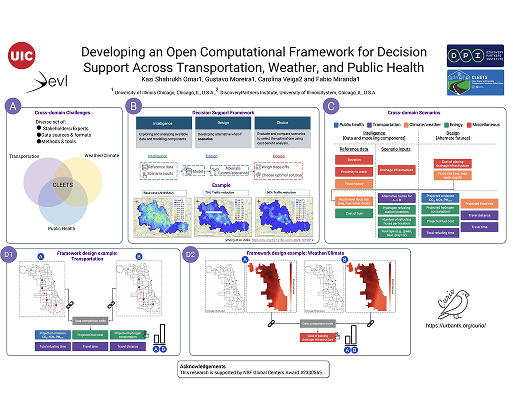 Developing an Open Computational Framework for Decision Support Across Transportation, Weather, and Public HealthKazi Shahrukh Omar, Gustavo Moreira, Carolina Veiga, and 1 more author2025
Developing an Open Computational Framework for Decision Support Across Transportation, Weather, and Public HealthKazi Shahrukh Omar, Gustavo Moreira, Carolina Veiga, and 1 more author2025Urban environments present complex challenges in diverse domains, requiring decision-making processes that integrate diverse data sources. Current systems created to support decision-making often lack the flexibility needed for interdisciplinary applications. To address this gap, this work establishes the foundation for an open computational framework designed to support decision-making across transportation, weather, and public health domains. We began by conducting a survey to assess experts’ data needs, common tasks, and decision-making processes. Insights from this survey informed the identification and definition of foundational components necessary for building a flexible decision-support system. Additionally, we present our efforts to integrate these components into Curio, a framework for collaborative cross-domain urban visual analysis. Curio employs a dataflow model with multiple abstraction levels - including code, grammar, and graphical user interface elements - enabling experts to integrate data preprocessing, management, and visualization while maintaining provenance tracking. Curio supports cross-domain analysis of urban datasets such as city-scale noise, shadow, sidewalk infrastructure, as well as climate and weather model outputs, among others. We demonstrate Curio’s potential through a set of use cases showcasing its ability to facilitate interdisciplinary analysis and support data-driven decision-making.
@misc{omar2025ocuds, title = {Developing an Open Computational Framework for Decision Support Across Transportation, Weather, and Public Health}, author = {Omar, Kazi Shahrukh and Moreira, Gustavo and Veiga, Carolina and Miranda, Fabio}, year = {2025}, howpublished = {Poster presented at Sustainability Research + Innovavtion Congress 2025} }
2024
-
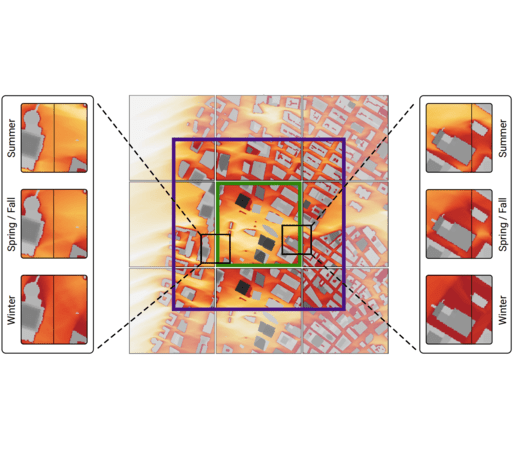 Deep Umbra: A Generative Approach for Sunlight Access Computation in Urban SpacesKazi Shahrukh Omar, Gustavo Moreira, Daniel Hodczak, and 4 more authorsIEEE Transactions on Big Data, 2024
Deep Umbra: A Generative Approach for Sunlight Access Computation in Urban SpacesKazi Shahrukh Omar, Gustavo Moreira, Daniel Hodczak, and 4 more authorsIEEE Transactions on Big Data, 2024Sunlight and shadow play critical roles in how urban spaces are utilized, thrive, and grow. While access to sunlight is essential to the success of urban environment, shadows can provide shaded places to stay during the hot seasons, mitigate heat island effect, and increase pedestrian comfort levels. Properly quantifying sunlight access and shadows in large urban environments is key in tackling some of the important challenges facing cities today. In this paper, we propose Deep Umbra, a novel computational framework that enables the quantification of sunlight access and shadows at a global scale. Our framework is based on a conditional generative adversarial network that considers the physical form of cities to compute high-resolution spatial information of accumulated sunlight access for the different seasons of the year. We use data from seven different cities to train our model, and show, through an extensive set of experiments, its low overall RMSE (below 0.1) as well as its extensibility to cities that were not part of the training set. Additionally, we contribute a set of case studies and a comprehensive dataset with sunlight access information for more than 100 cities across six continents of the world. Deep Umbra is available at urbantk.org/shadows
@article{omar2024deep, title = {Deep Umbra: A Generative Approach for Sunlight Access Computation in Urban Spaces}, doi = {https://doi.org/10.1109/TBDATA.2024.3382964}, author = {Omar, Kazi Shahrukh and Moreira, Gustavo and Hodczak, Daniel and Hosseini, Maryam and Colaninno, Nicola and Lage, Marcos and Miranda, Fabio}, journal = {IEEE Transactions on Big Data}, volume = {11}, number = {2}, pages = {388--401}, year = {2024}, publisher = {IEEE}, }
2022
-
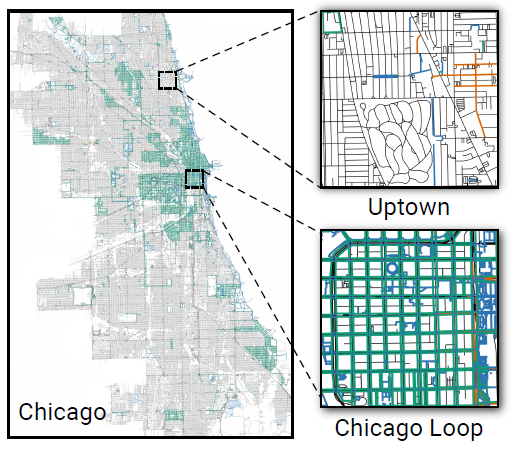 Crowdsourcing and Sidewalk Data: A Preliminary Study on the Trustworthiness of OpenStreetMap Data in the USKazi Shahrukh Omar, Gustavo Moreira, Daniel Hodczak, and 2 more authorsASSETS UrbanAccess Workshop, 2022
Crowdsourcing and Sidewalk Data: A Preliminary Study on the Trustworthiness of OpenStreetMap Data in the USKazi Shahrukh Omar, Gustavo Moreira, Daniel Hodczak, and 2 more authorsASSETS UrbanAccess Workshop, 2022Sidewalks play a pivotal role in urban mobility of everyday life. Ideally, sidewalks provide a safe walkway for pedestrians, link public transportation facilities, and equip people with routing and navigation services. However, there is a scarcity of open sidewalk data, which not only impacts the accessibility and walkability of cities but also limits policymakers in generating insightful measures to improve the current state of pedestrian facilities. As one of the most famous crowdsourced data repositories, OpenStreetMap (OSM) could aid the lack of open sidewalk data to a large extent. However, completeness and quality of OSM data have long been a major issue. In this paper, we offer a preliminary study on the availability and trustworthiness of OSM sidewalk data. First, we compare OSM sidewalk data coverage in over 50 major cities in the United States. Then, we select three major cities (Seattle, Chicago, and New York City) to further analyze the completeness of sidewalk data and its features, and to compute a trustworthiness index leveraging historical OSM sidewalk data.
@article{omar2022crowdsourcing, title = {Crowdsourcing and Sidewalk Data: A Preliminary Study on the Trustworthiness of OpenStreetMap Data in the US}, author = {Omar, Kazi Shahrukh and Moreira, Gustavo and Hodczak, Daniel and Hosseini, Maryam and Miranda, Fabio}, journal = {ASSETS UrbanAccess Workshop}, year = {2022}, }
2021
-
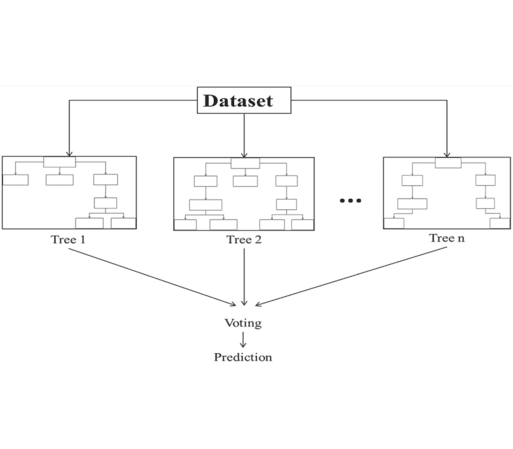 Exploring Tree-based Machine Learning Methods to Predict Autism Spectrum DisorderKazi Shahrukh Omar, Muhammad Nazrul Islam, and Nabila Shahnaz KhanIn Neural Engineering Techniques for Autism Spectrum Disorder, 2021
Exploring Tree-based Machine Learning Methods to Predict Autism Spectrum DisorderKazi Shahrukh Omar, Muhammad Nazrul Islam, and Nabila Shahnaz KhanIn Neural Engineering Techniques for Autism Spectrum Disorder, 2021@incollection{omar2021exploring, title = {Exploring Tree-based Machine Learning Methods to Predict Autism Spectrum Disorder}, doi = {https://doi.org/10.1016/B978-0-12-822822-7.00009-0}, author = {Omar, Kazi Shahrukh and Islam, Muhammad Nazrul and Khan, Nabila Shahnaz}, booktitle = {Neural Engineering Techniques for Autism Spectrum Disorder}, pages = {165--183}, year = {2021}, publisher = {Elsevier}, }
2019
-
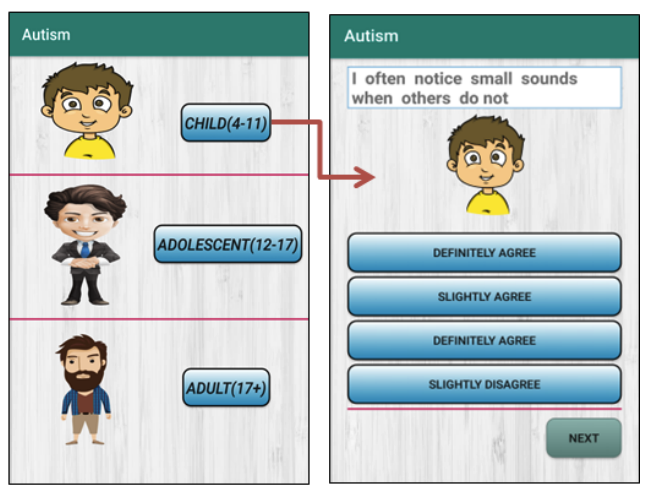 A Machine Learning Approach to Predict Autism Spectrum DisorderKazi Shahrukh Omar, Prodipta Mondal, Nabila Shahnaz Khan, and 2 more authorsIn International conference on electrical, computer and communication engineering (ECCE), 2019
A Machine Learning Approach to Predict Autism Spectrum DisorderKazi Shahrukh Omar, Prodipta Mondal, Nabila Shahnaz Khan, and 2 more authorsIn International conference on electrical, computer and communication engineering (ECCE), 2019In present day Autism Spectrum Disorder (ASD) is gaining its momentum faster than ever. Detecting autism traits through screening tests is very expensive and time consuming. With the advancement of artificial intelligence and machine learning (ML), autism can be predicted at quite early stage. Though number of studies have been carried out using different techniques, these studies didn’t provide any definitive conclusion about predicting autism traits in terms of different age groups. Therefore this paper aims to propose an effective prediction model based on ML technique and to develop a mobile application for predicting ASD for people of any age. As outcomes of this research, an autism prediction model was developed by merging Random Forest-CART (Classification and Regression Trees) and Random Forest-ID3 (Iterative Dichotomiser 3) and also a mobile application was developed based on the proposed prediction model. The proposed model was evaluated with AQ10 dataset and 250 real dataset collected from people with and without autistic traits. The evaluation results showed that the proposed prediction model provide better results in terms of accuracy, specificity, sensitivity, precision and false positive rate (FPR) for both kinds of datasets.
@inproceedings{omar2019machine, title = {A Machine Learning Approach to Predict Autism Spectrum Disorder}, doi = {https://doi.org/10.1109/ECACE.2019.8679454}, author = {Omar, Kazi Shahrukh and Mondal, Prodipta and Khan, Nabila Shahnaz and Rizvi, Md Rezaul Karim and Islam, Md Nazrul}, booktitle = {International conference on electrical, computer and communication engineering (ECCE)}, pages = {1--6}, year = {2019}, organization = {IEEE}, } -
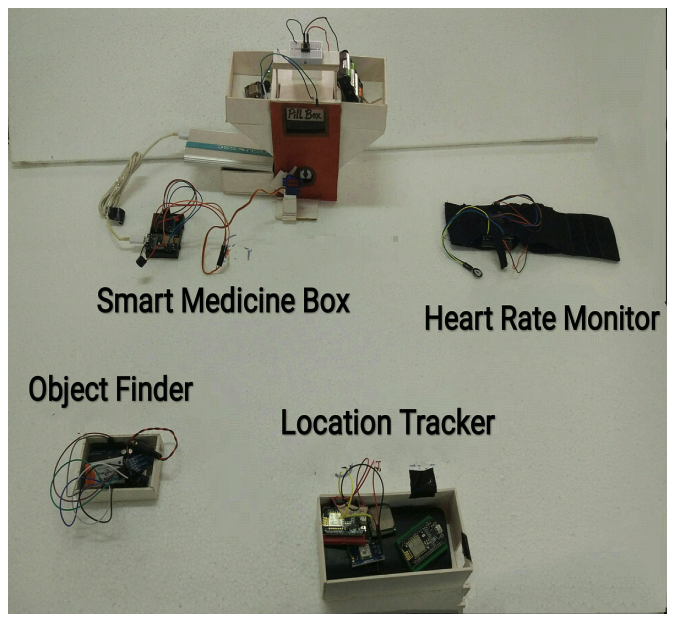 An Intelligent Assistive Tool for Alzheimer’s PatientKazi Shahrukh Omar, Afia Anjum, Tahrima Oannahary, and 7 more authorsIn International Conference on Advances in Science, Engineering and Robotics Technology (ICASERT), 2019
An Intelligent Assistive Tool for Alzheimer’s PatientKazi Shahrukh Omar, Afia Anjum, Tahrima Oannahary, and 7 more authorsIn International Conference on Advances in Science, Engineering and Robotics Technology (ICASERT), 2019Alzheimer’s Disease (AD) is a chronic neurodegenerative disease that causes to develop dementia. Alzheimer’s patients find it hard to remember recent events, reason and even to recognize people they know. As the disease advances, symptoms can include difficulty with language, disorientation including getting lost, mood swings, loss of motivation, lack of self-awareness and overall behavior. Though a limited number of IT based solutions exist to provide support for Alzheimer’s patients, but most of these provide very isolated services either for the patients or for the caregivers. The objective of this research is to propose an assistive tool for Alzheimer’s patients and their caregivers to provide support like health monitoring, assist to find lost items, provide reminder to take medicine and assist to monitor patient’s location. A light-weighted evaluation study was carried out with 15 participants. The evaluation study showed that the proposed system was effective and usable for the patients and their caregivers.
@inproceedings{omar2019intelligent, title = {An Intelligent Assistive Tool for Alzheimer’s Patient}, doi = {https://doi.org/10.1109/ICASERT.2019.8934542}, author = {Omar, Kazi Shahrukh and Anjum, Afia and Oannahary, Tahrima and Rizvi, Rezaul Karim and Shahrin, Diana and Anannya, Tasmiah Tamzid and Tumpa, Sanjida Nasreen and Karim, MMahboob and Islam, Muhammad Nazrul and Rabbi, Fazle}, booktitle = {International Conference on Advances in Science, Engineering and Robotics Technology (ICASERT)}, pages = {1--6}, year = {2019}, organization = {IEEE}, }